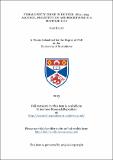Files in this item
Female petty crime in Dundee, 1865-1925 : alcohol, prostitution and recidivism in a Scottish city
Item metadata
| dc.contributor.advisor | Allan, David | |
| dc.contributor.author | Haider, Suki | |
| dc.coverage.spatial | xii, 490 p. | en_US |
| dc.date.accessioned | 2013-10-29T14:22:04Z | |
| dc.date.available | 2013-10-29T14:22:04Z | |
| dc.date.issued | 2013 | |
| dc.identifier.uri | https://hdl.handle.net/10023/4126 | |
| dc.description.abstract | Late-nineteenth and early twentieth-century Dundee had a strikingly large female workforce and this fact has attracted much scholarly attention. But existing research has not probed the official crime records to determine whether the associated local stereotype of the disorderly mill worker, as a ‘moral blot’ on the landscape, is justified. This study looks at female criminality in Dundee 1865–1925. It finds that drunkenness, breach of the peace and theft were the leading female offences and that the women most strongly associated with criminality belonged to the marginalised sections of the working class. Amongst them were the unskilled mill girls prominent in the contemporary discussions, but it was prostitutes and women of ‘No Trade’ who appear to have challenged the police most often. They were frequently repeat offenders and consequently this thesis devotes considerable attention to the women entrenched in Dundee’s criminal justice system. A pattern noted in the city’s recidivism statistics, and often echoed elsewhere, is that the most persistent offenders were women. The fact that men perpetrated the majority of petty crime raises the suspicion that the police statistics capture differential policing of male and female recidivists – an idea that builds upon feminist theory and Howard Taylor’s stance on judicial statistics. Yet a detailed study of the archives reveals that there are as many examples of the police treating women fairly as there are of gender-biased law. Indeed, several practical constraints hindered over-zealous policing, one of which was the tendency of the local magistrates to throw out cases against prostitutes and female drunks. This thesis, taking the police and court records as a whole, emphasizes that it was generally pragmatism, rather than prejudice, that guided the sanctioning of female recidivists in Dundee. | en_US |
| dc.language.iso | en | en_US |
| dc.publisher | University of St Andrews | |
| dc.rights | Creative Commons Attribution-NonCommercial-NoDerivs 3.0 Unported | |
| dc.rights.uri | http://creativecommons.org/licenses/by-nc-nd/3.0/ | |
| dc.subject | Women's crime | en_US |
| dc.subject | Female crime | en_US |
| dc.subject | Recidivism | en_US |
| dc.subject | Habitual offender | en_US |
| dc.subject | Habitual drunkard | en_US |
| dc.subject | Victorian | en_US |
| dc.subject | Edwardian | en_US |
| dc.subject | Dundee | en_US |
| dc.subject | Scotland | en_US |
| dc.subject | Alcoholism | en_US |
| dc.subject | Poverty | en_US |
| dc.subject | Prison science | en_US |
| dc.subject | Criminology | en_US |
| dc.subject | Police | en_US |
| dc.subject | Judges | en_US |
| dc.subject | Bailies | en_US |
| dc.subject | Magistrates | en_US |
| dc.subject | Sherriff | en_US |
| dc.subject | Court | en_US |
| dc.subject | Criminal justice system | en_US |
| dc.subject | Mills | en_US |
| dc.subject | Jute | en_US |
| dc.subject | Factory | en_US |
| dc.subject | Empire | en_US |
| dc.subject.lcc | HV6046.H25 | |
| dc.subject.lcsh | Female offenders--Scotland--Dundee--History | en_US |
| dc.subject.lcsh | Women alcoholics--Scotland--Dundee--History | en_US |
| dc.subject.lcsh | Prostitution--Scotland--Dundee--History | en_US |
| dc.subject.lcsh | Recidivism--Scotland--Dundee--History | en_US |
| dc.title | Female petty crime in Dundee, 1865-1925 : alcohol, prostitution and recidivism in a Scottish city | en_US |
| dc.type | Thesis | en_US |
| dc.contributor.sponsor | Arts and Humanities Research Council (AHRC) | en |
| dc.contributor.sponsor | University of St Andrews | en |
| dc.type.qualificationlevel | Doctoral | en_US |
| dc.type.qualificationname | PhD Doctor of Philosophy | en_US |
| dc.publisher.institution | The University of St Andrews | en_US |
This item appears in the following Collection(s)
Except where otherwise noted within the work, this item's licence for re-use is described as Creative Commons Attribution-NonCommercial-NoDerivs 3.0 Unported
Items in the St Andrews Research Repository are protected by copyright, with all rights reserved, unless otherwise indicated.


